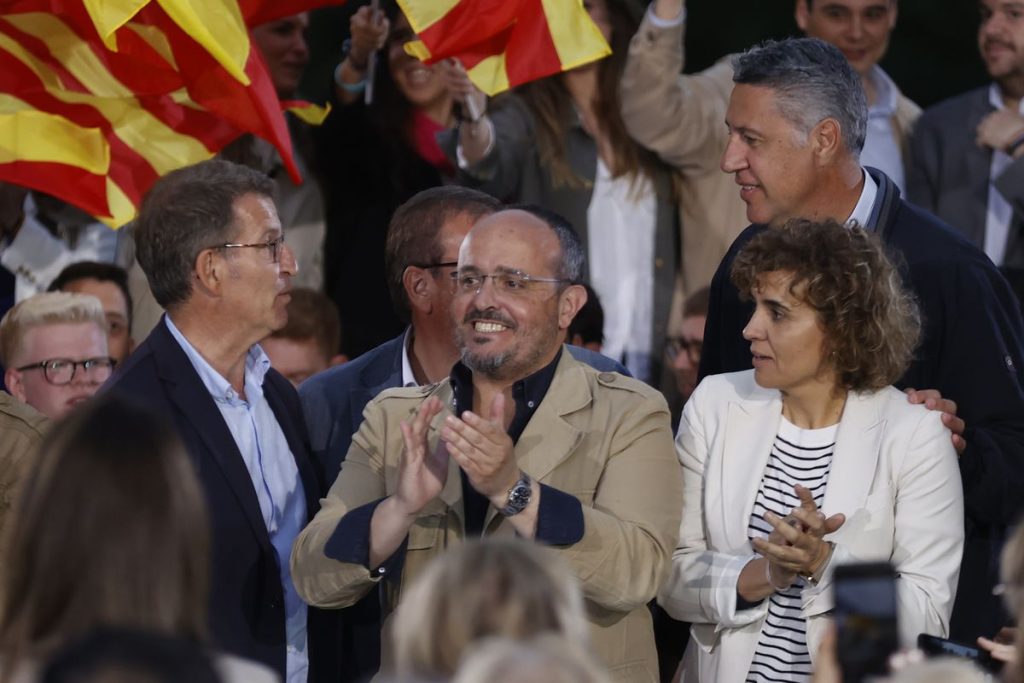The candidacy of the PP in Catalonia has become tangled six days after the announcement of the early elections. The national leadership faces two complex scenarios: the choice of their candidate, amidst internal conflict, and negotiations with Ciudadanos to run on a single list on May 12, which has become complicated in recent hours. The national leadership at the headquarters on Génova Street in Madrid prioritizes closing the pact with CS, which has become complicated because Carlos Carrizosa’s party rejects merging into the PP lists and demands a coalition of parties; meanwhile, the leadership is torn between continuity or a change in the top position. The dilemma, which Alberto Núñez Feijóo must resolve, revolves around supporting an alternative candidate, for which the best-positioned candidate is the head of the European Popular Party delegation, Dolors Montserrat, or maintaining Alejandro Fernández as number one to avoid a clash if replaced. Feijóo has not yet made a decision, and the clock is ticking, causing nervousness within the party. Sources close to the PP leadership note that there is a divide between those supporting Dolors and those advocating for Alejandro, with the chances currently sitting at 50/50.
The decision on the PP’s strategy in Catalonia is strategic for Feijóo, who must weigh the pros and cons of pushing for a change in the top position. Polls predict a growth for the PP (up to 11 or 12 seats from the current 3 in the Parliament) without having the candidate confirmed yet, leading some leaders to believe that “the candidate, whoever it may be, will not be as relevant in this campaign” and that the strategy is more important. However, critics of Fernández argue that the MP is “unpredictable” and there could be discrepancies between his discourse and that set by the national leadership, emphasizing the importance of alignment. Other party voices suggest that a candidate who can build and strengthen the party is needed, pointing to potential replacements for Fernández such as Daniel Sirera, leader of the PP in the Barcelona City Council, and Nacho Martín Blanco, former CS spokesperson and head of the PP list in Barcelona in the last general elections.
In contrast, supporters of the current PP leader in Catalonia argue that he has the backing of “70% of the local boards” of the PP in Catalonia and the majority of constitutional civil entities. Councilors and members are showing support online with the hashtag #YoConAlejandro. Fernández wants to continue leading the candidacy and has shown this in discreet conversations with members of the leadership who have contacted him in recent days. However, Génova has not confirmed this, and Feijóo stated in an interview that he wants to resolve the negotiation with Ciudadanos before addressing the candidate issue. The problem lies in the fact that the agreement with CS has also become entangled. The possible pact does not look promising as both parties have entrenched themselves in opposing positions, with the PP rejecting a coalition and Ciudadanos insisting on it. Talks have stalled as the PP suggests integrating Ciudadanos candidates into their lists, a proposal that is strongly rejected by Ciudadanos, who assert that they will run separately rather than under another party’s name.
The PP is pursuing the pact with Ciudadanos to absorb their former voters, who may otherwise abstain from voting. Ciudadanos has suffered losses in terms of councilors and MPs and has all but disappeared in Spain, surviving only in Catalonia, where it has six seats in Parliament. However, recent polls suggest they may not secure a spot. The PP sees the pact with Ciudadanos as a way to solidify their support base but faces opposition from Ciudadanos, who refuse to be absorbed by the PP in Catalonia. The negotiations have become complicated, and the outcome remains uncertain. The decision on both the candidacy and the agreement with Ciudadanos will have significant implications for the PP and its prospects in the Catalonia elections.


